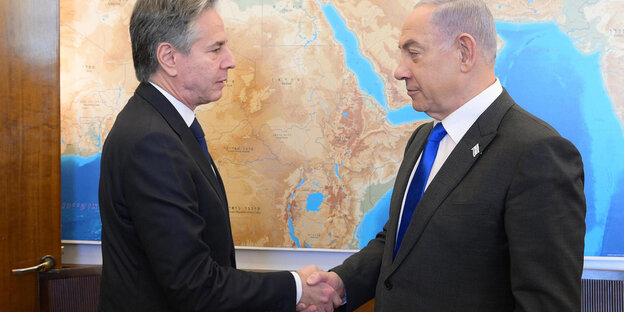What the terrorist group Hamas demands is a lot. Israeli Prime Minister Netanyahu's rejection of a deal to release the hostages remains heartless.

US Secretary of State Blinken in Israel Photo: Amos Ben-Gershom/GPO/dpa
Relatives and friends of people kidnapped by Islamists in the Gaza Strip must have felt a shiver run through their bodies upon hearing Israeli Prime Minister Benjamin Netanyahu's reaction to Hamas' demands. There will probably be no more hostage exchanges for Palestinian prisoners in the foreseeable future. This is bitter news, especially for those who for more than four months have constantly feared death, are hungry and thirsty somewhere in the labyrinth of the barely ventilated tunnel, waiting in vain for their rescue. Netanyahu's clear no to the undoubtedly high price that Hamas is putting as a condition for renewing the agreement is ruthless and cold-blooded.
The Islamists are demanding a complete ceasefire, the withdrawal of troops and the release of some 1,500 Palestinian prisoners, including hundreds serving life sentences for participating in bloody terrorist attacks. The hesitation not only of Netanyahu, but also of numerous Israeli citizens, about the release of these criminals is understandable.
Sinwar is the best example of the danger of such an agreement
No one needs to believe that the men who spent years in Israeli prisons will work for a peaceful solution after their release. Jahia Sinwar, the central mastermind of the October 7 massacre, is the best example that there are good reasons for widespread fear. He was freed in 2011 in exchange for Israeli soldier Gilad Schalit. Sinwar acknowledges that he has used his time in prison to study the enemy.
Hamas held Shalit hostage for more than five years. To end his suffering, the government – also under Netanyahu's leadership at the time – managed to free more than a thousand Palestinian prisoners. This sets the bar high for future hostage negotiations.
There are still around 100 kidnapped people alive, perhaps only 85 if it is assumed that Wall Street Journal published, gives credibility. Maybe even less. She would not have survived another 50 days, said an Israeli woman who was freed in the first exchange. Every additional day in captivity can be a death sentence. Bringing all the hostages home now must be the top priority, no matter the cost. When the last kidnapped person is free, the fight against terrorists can continue.
There is no time to lose, otherwise there will soon be no hostages left alive to negotiate their release.